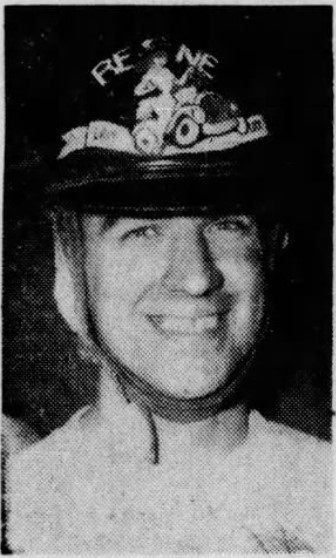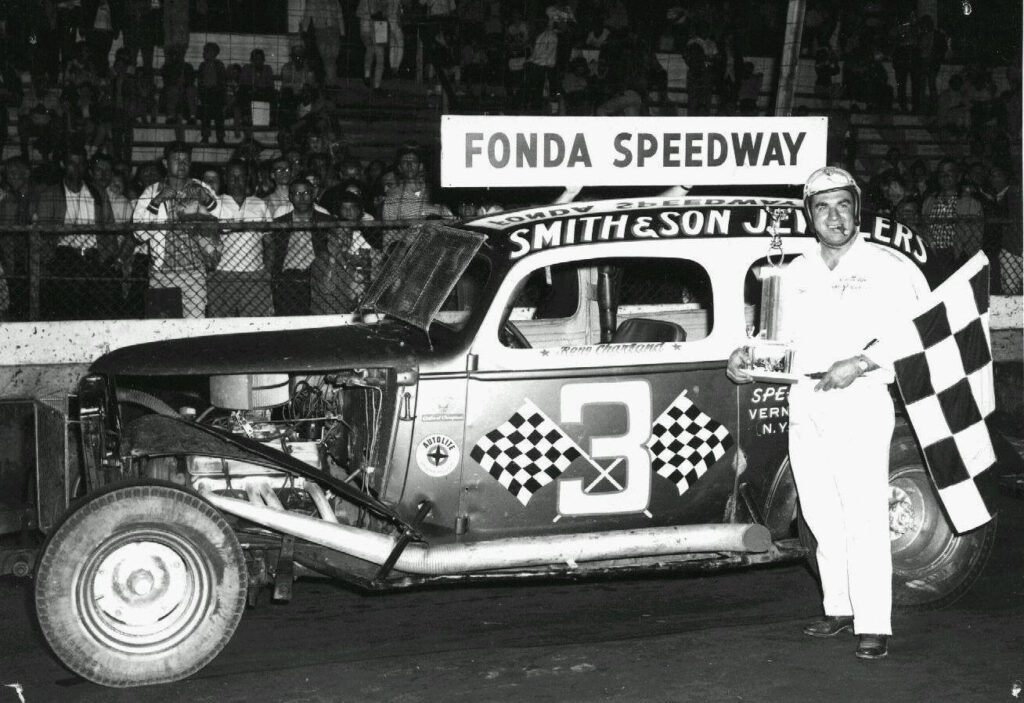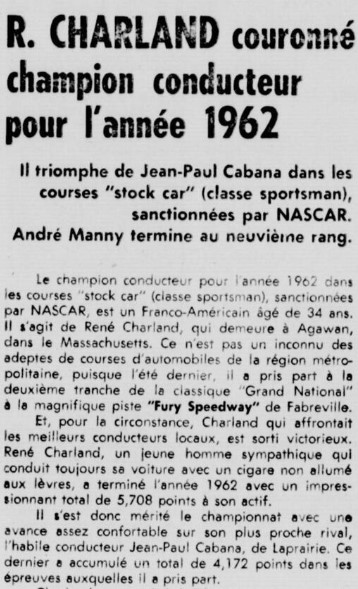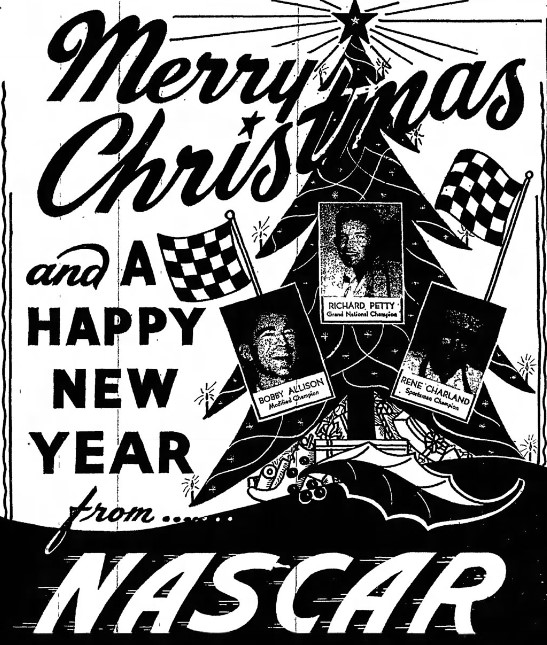Let’s start with this: the guy beat an Earnhardt.
The annals of Nascar’s highest levels are filled with French names—Bouchard, Labonte, Lajoie, Nadeau, etc. Local short tracks across the U.S. Northeast have had their share of competitors of French-Canadian descent. But, for all of that talent, few have reached the caliber, reputation, or fame of Rene Charland.

Charland was not a Franco-American in the way that Madonna is a Franco-American. Not only was he fluently bilingual, he was a first-generation American. (Later newspaper reports would occasionally, and inaccurately, identify him as a Canadian.) His father, Adélard, was a native of Saint-David-d’Yamaska in Quebec. His mother, the on-ne-peut-plus-français Noëlla Lamoureux, hailed from Saint-Jude. Both had immigrated in 1922. They married in Massachusetts, where Rene was born in 1928.
The family lived in Chicopee. Adélard was a truck driver; at the time of the Second World War, he was working for the Parenteau Used Car Exchange in Chicopee. His father’s occupation may have had some bearing on young Rene’s direction in life. He served in the armed forces and took a job sanding guns and blades, but once bit by the auto racing bug, at age 19, there was simply no other option.
From one track to the next, Charland met with success. But skill was only part of it. He was a phenomenon—and his persona had much to do with it. In the words of one sports reporter, Charland was “a short, stocky driver who had a cigar constantly in his mouth. He was always smiling. He was an outgoing personality with a rousing sense of humor. He would end every conversation with loud laughter—echoed by everyone else involved.” This was also a fellow who happened to ride in rodeos “just for fun.”

He raced on dirt. He raced on tar. Driving numbers 888 and 3, he raced everywhere from Quebec to Florida, notably in modified and late-model classes. At a time of much laxer safety standards, he was lucky to avoid serious accidents, though that may be because, more often than not, he was at the front of the field. His only brush with death came in a wreck in 1966; rival Ed Flemke pulled Charland out of his burning car.
In the early 1960s, Charland, like Flemke, joined the Nascar circuit. The sport bore little comparison to today’s formula. A season might include more than sixty officially sanctioned races. Several races might be run on the same day—on different tracks, in different states. The points system favored those who could travel widely and run consistently. A full-time driver who ventured beyond the northeastern circuit, Charland racked up wins at countless tracks and, in his top-performing seasons, won more than a quarter of the races he entered.
He also found his way to bigger prizes: championships. He won four consecutive championships in Nascar’s national Sportsman Series (later the Busch Series and now Xfinity). He remains the only driver to win four straight championships in that series. The feat was not replicated in any of Nascar’s top national series until 2009, when Jimmie Johnson won the fourth of five back-to-back titles. In 1965, his final championship year, Charland beat out Ralph Earnhardt (father of Dale), former Grand National champion Rex White, and short-track legend Bob Pressley for the top honors.

Charland competed in a small number of races at the highest level, the Grand National Series (now Cup), with varying results. His crowning achievement was a third-place finish—behind David Pearson and Richard Petty—in Fonda, New York, in 1966. He was driving a Ford Fairlane.
He remained a one-of-a-kind figure in the later part of his career. Asked about a wild spin at Daytona, he explained, “those high-speed spins and crashes aren’t really so bad. It’s just the sudden stops that get you.” He added that racing is
a business for men who like to live. When a man is racing, he is living. I’ve been busted up, in the hospital, broke, made money, spent it all for [r]acing. I’d do it all over again if I had to. I love racing. It’s my life.
The comments came on the eve of a race in Martinsville, Virginia, at which he raced a modified 1936 Chevrolet.
He continued driving past age 50 and retired in the 1980s. He was inducted into the New England Auto Racers Hall of Fame in 1998. After gentle ribbing from the master of ceremonies, Charland joked, “You’re only jealous because you ain’t French.”
Charland passed away in 2013 after numerous other accolades.
Sources
Web:
- 50 Greatest Modified Drivers (Stafford Speedway)
- 1965 NASCAR Late Model Sportsman National Championship (Third Turn)
- New England Auto Racers
- Rene Charland, a Driver Much More Than a Comical Prankster
- Rene M. “da Champ” Charland (Obituary)
Newspaper Items:
- Daily Home News [New Brunswick, N.J.], August 17, 1954
- Daily Times-News [Burlington, N.C.], March 18, 1971
- News-Herald [Franklin and Oil City, Penn.], February 17, 1962

Charming, actually. Love the ever-present cigar.
I wonder whether my dad was a fan. That generation of Forciers and Cheneverts lived in Holyoke/Chicopee. That branch of the family seemed to love all sorts of races. Oh, my Riverside Park, Used to go there as a kid. Vague recollections of a racecar track there.
Good stuff Patrick!
Interesting! I bet they cheered on the local hero! Thank you for reading. Unrelated: The only context in which I’ve seen the last name Chenevert (aside from this comment) is in Gabrielle Roy’s ‘Alexandre Chenevert’ (1954).
As a teenager in the late 60’s,I spent many a Friday night at l’Autodrome de Granby. The higher the prize money the more racers from Catamount crossed the border northbound to pocket some easy cash. They were often well sponsored and had better cars but the locals knew the track. So it made for some very close and exciting racing.The announcer had no trouble with the visiting names as they were often french like René Chartrand.